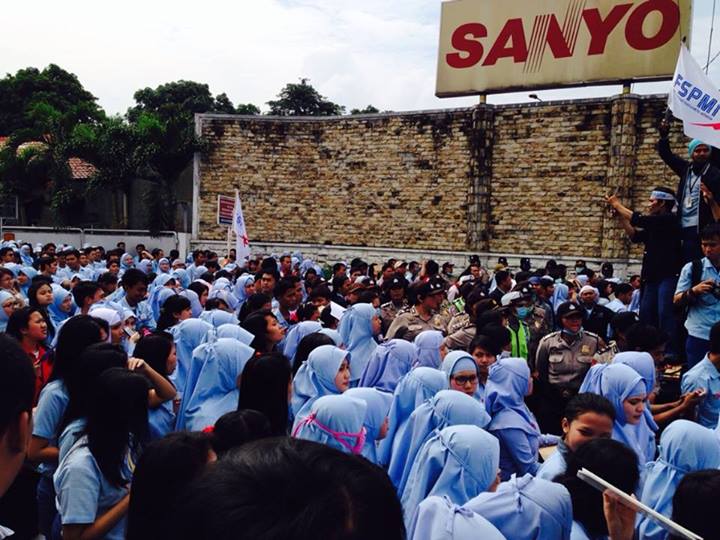
Thousands of workers left production in a Sanyo factory. Photo from Facebook page of Tia Claudia E. Mboeik
According to organizers, two million workers in 20 provinces have joined the strike. Workers across the country have launched a series of protests in the past month in preparation for the October 31-November 1 strike. There were factory shutdowns, union visits, and rallies to recruit workers to join the strike. On October 21, unions gathered 20,000 workers for a national dialogue.
Aside from salary hike, workers have issued the following demands:
1. 50% increase in minimum wages
2. Universal healthcare
3. Abolition of outsourcing
4. Abolition of an anti-labour law (Presidential Instruction No. 9/2013) that not only suppresses the minimum wage but also instructs the police force to “monitor the process to set a minimum wage and the implementation of minimum wage policy”.
5. Pass a law to protect domestic workers.
Outsourcing refers to the casualization of labor and contract system:
Making sure that government is not implementing “modern slavery” working system in Indonesia, in other words, the eradication of Outsourcing and Casualization/Contract Employment System, including the eradication in State Owned Enterprises and make all outsourced employee in state owned enterprise as permanent workers.
Protection of domestic workers is also being pressed by human rights groups. Matthew Rullo explains:
Indonesia, like many other countries in Asia and the Middle East, excludes domestic workers — or pembantu rumah tangga — from its national labor laws. This leaves their work largely unregulated and denies domestic workers access to basic rights enjoyed by other workers, such as a minimum wage, weekly days off, and overtime. Their exclusion from key labor protections is exacerbated by the unique isolation domestic workers face in the private homes of their employers — where they are often subject to an array of exploitative conditions and criminal abuse.
The Joint Labor Secretariat accused the government of conniving with big business to further drive down the living conditions of workers:
Even in our workplaces, although there is a mountain of profit for the business owners, there is not even a drop for us, except cheap wages, just enough to keep us alive for work the next day.
We should already have fair and prosperous lives. What a pity that justice and prosperity is only owned and controlled by a minority of rich people in this country. All this cannot be seen as separate from the economic system that is carried out by the current government that is clearly not devoted to the interests of the people.
But not everybody believes that holding a strike is the right approach to increase the minimum wage. PakMB comments:
Increasing wages force the companies to become more efficient, which is needed in the long run. In the end wages tend to be settled by supply and demand, not so much by unions and employers.
SiangMalam warns that investors will leave if Indonesia will raise the minimum wage:
Cost of labour normally comprises about 40% of manufacturer's total cost if high wage does not come with high productivity or results, investors will go elsewhere… the unions are being irresponsible in organizing strikes without working on worker's productivity…
Below are some reactions on Twitter:
This rhetoric on the general strike is just incomprehensible. Most Indonesians would agree that inequality is a major problem in Indonesia.
— Atria Paramost (@sapratama) October 31, 2013
No operator, no production. No work, no pay. #MogokNasional #LoyalitasItuMahal pic.twitter.com/ThaIsvs3i2
— Eben Osvaldo Silaen (@Eben_Silaen) October 31, 2013
#nurses and hospital #workers in #jakarta join the #mogoknasional with black ribbon! pic.twitter.com/AthHRTeV5r
— indah budiarti (@indahbudiarti) October 31, 2013







1 comment